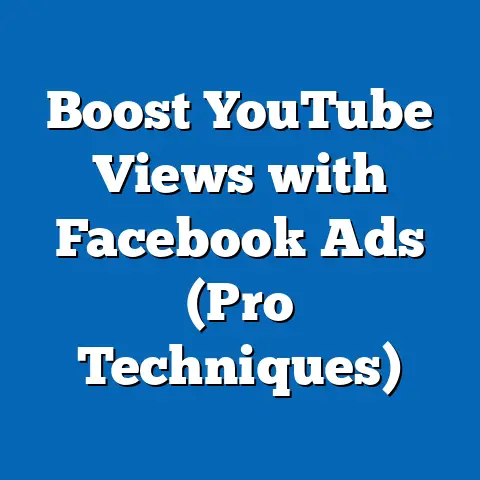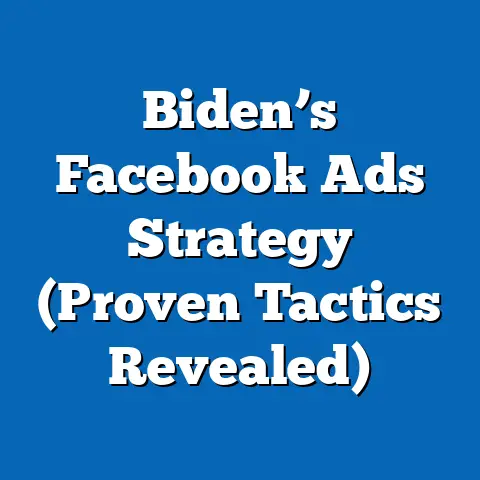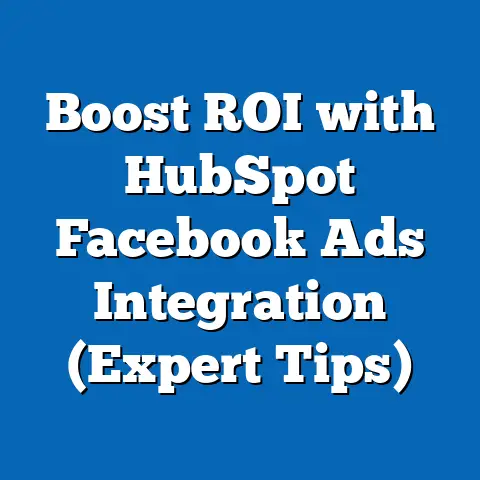Uncovering Email Addresses on Facebook (Expert Strategies)
Imagine a world where reaching out to potential customers is as simple as a click of a button.
Envision a scenario where every interaction on Facebook not only enhances brand visibility but also enables you, as a marketer, to gather invaluable data, including email addresses.
What if you could tap into the vast pool of Facebook users and connect with them directly via email, transforming your marketing strategy overnight?
Sounds like a dream, right?
Well, while Facebook doesn’t exactly hand out email addresses on a silver platter, there are definitely strategies you can employ to ethically and effectively uncover them.
In this article, I’ll share my expert insights and actionable techniques to help you do just that.
The Importance of Email Addresses in Digital Marketing
Let’s face it: social media is a crowded space.
While platforms like Facebook are fantastic for building brand awareness and engaging with your audience, email remains a powerhouse for direct, personalized communication.
Email marketing provides a direct line to your audience, allowing you to deliver tailored messages that resonate and drive conversions.
Consider these statistics:
- Email marketing has an ROI of $42 for every $1 spent. This is significantly higher than other marketing channels, including social media.
(Source: DMA) - Email is 40 times more effective at acquiring new customers than Facebook or Twitter. (Source: McKinsey)
- Personalized emails generate 6x higher transaction rates. (Source: Experian)
These numbers speak volumes.
Email allows for a level of personalization that’s difficult to achieve on social media.
You can segment your audience based on their interests, purchase history, and behavior, and then craft messages that speak directly to their needs.
This leads to improved customer retention, higher conversion rates, and a more engaged audience.
Takeaway: Don’t underestimate the power of email.
It’s a crucial component of a well-rounded digital marketing strategy.
Your next step is to actively seek out opportunities to grow your email list through Facebook.
Navigating the Legal Landscape: A Must-Read Before You Start
Before diving into the how-to, it’s crucial to understand the legal and ethical considerations surrounding data collection.
The digital landscape is heavily regulated, and rightfully so.
Consumers are increasingly concerned about their privacy, and respecting their rights is not only the right thing to do but also essential for building long-term trust and brand reputation.
Here’s a quick overview of some key regulations:
- GDPR (General Data Protection Regulation): This EU law applies to any organization that collects or processes personal data of EU citizens, regardless of where the organization is located.
Key requirements include obtaining explicit consent for data collection, providing transparency about data usage, and allowing individuals to access, rectify, and erase their data. - CCPA (California Consumer Privacy Act): Similar to GDPR, CCPA grants California residents significant rights over their personal data, including the right to know what data is being collected, the right to delete their data, and the right to opt-out of the sale of their data.
- CAN-SPAM Act (Controlling the Assault of Non-Solicited Pornography And Marketing Act): This US law sets rules for commercial email, including requirements for clear subject lines, opt-out mechanisms, and accurate sender information.
Ethical Practices are Paramount:
Beyond legal compliance, it’s vital to adopt ethical practices in data collection.
This means being transparent about how you collect and use email addresses, obtaining explicit consent before sending marketing emails, and providing easy opt-out options.
Remember, building trust with your audience is far more valuable than acquiring a large email list through questionable means.
My Personal Experience: I once worked with a company that purchased a large email list from a third-party vendor.
The campaign initially seemed successful, with high open rates.
However, the unsubscribe rates were even higher, and the company quickly received numerous complaints.
The damage to their brand reputation far outweighed any short-term gains.
Takeaway: Always prioritize ethical and legal data collection practices.
Transparency, consent, and respect for privacy are essential for building long-term relationships with your audience.
Facebook’s Tools and Features for Data Collection: Your Arsenal
Facebook offers a range of tools and features that can be leveraged for gathering email addresses ethically and effectively.
Here are some of the most valuable:
1. Facebook Lead Ads:
Lead Ads are designed specifically for lead generation.
They allow users to submit their contact information, including email addresses, directly within the Facebook platform, without having to navigate to an external landing page.
This streamlined process makes it incredibly easy for users to sign up, leading to higher conversion rates.
Creating Effective Lead Generation Campaigns:
- Offer a compelling incentive: This could be a free ebook, a discount code, a webinar registration, or access to exclusive content.
The key is to offer something that your target audience genuinely values. - Keep the form short and simple: Only ask for the essential information you need.
The more fields you include, the lower your conversion rate will be. - Write clear and concise ad copy: Explain the benefits of signing up and make it easy for users to understand what they’re getting in return.
- Use high-quality visuals: Choose images or videos that are visually appealing and relevant to your offer.
- Target your audience precisely: Use Facebook’s targeting options to reach the people who are most likely to be interested in your offer.
Types of Offers That Work Best:
- Exclusive content: Offer access to a valuable ebook, white paper, or video series that’s not available anywhere else.
- Discounts and promotions: Provide a special discount code or offer a limited-time promotion to incentivize sign-ups.
- Webinar registrations: Invite users to register for a free webinar on a topic that’s relevant to their interests.
- Free trials: Offer a free trial of your product or service to allow users to experience its benefits firsthand.
- Contests and giveaways: Host a contest or giveaway and require users to provide their email address to enter.
2. Facebook Custom Audiences:
Custom Audiences allow you to target your ad campaigns to specific groups of people based on your existing customer data.
You can upload a list of email addresses, phone numbers, or other identifiers to create a Custom Audience.
Facebook will then match those identifiers to Facebook users and allow you to target your ads to those individuals.
Using Existing Customer Data:
- Upload your customer email list: This is the most straightforward way to create a Custom Audience.
- Use website traffic data: Create a Custom Audience of people who have visited your website.
- Engage with your Facebook page: Target people who have liked your page, commented on your posts, or watched your videos.
Building Targeted Ad Campaigns:
- Retarget website visitors: Show ads to people who have visited your website but haven’t made a purchase.
- Upsell existing customers: Target customers who have already purchased your product or service with ads for related products or services.
- Re-engage inactive customers: Show ads to customers who haven’t made a purchase in a while to remind them of your brand.
- Create Lookalike Audiences: Use your Custom Audience to create a Lookalike Audience of people who share similar characteristics.
3. Facebook Pixel:
The Facebook Pixel is a small piece of code that you install on your website.
It allows you to track the actions that people take on your website after clicking on your Facebook ad.
This data can be used to optimize your ad campaigns, retarget website visitors, and measure the effectiveness of your marketing efforts.
Installing and Utilizing the Facebook Pixel:
- Generate your Pixel code: Create a Facebook Pixel in your Ads Manager account.
- Install the Pixel code on your website: Paste the Pixel code into the header section of your website.
- Track website events: Set up event tracking to track specific actions that people take on your website, such as adding items to their cart, initiating checkout, or completing a purchase.
Retargeting and Data Collection:
- Retarget website visitors: Show ads to people who have visited specific pages on your website.
- Optimize your ad campaigns: Use the data collected by the Pixel to optimize your ad campaigns for conversions.
- Create Custom Audiences: Create Custom Audiences based on website traffic data.
Takeaway: Facebook provides powerful tools for collecting email addresses ethically and effectively.
By leveraging Lead Ads, Custom Audiences, and the Facebook Pixel, you can significantly grow your email list and improve your marketing results.
Crafting Engaging Content to Capture Leads: Hook, Line, and Sinker
Creating compelling content is crucial for encouraging users to share their email addresses.
Simply asking for an email address isn’t enough.
You need to provide value and give users a reason to trust you with their personal information.
Incentives that Entice:
- Exclusive Content: Offer access to a valuable ebook, white paper, or video series that’s not available anywhere else.
This is a great way to position yourself as an expert in your field and provide valuable information to your audience. - Discounts and Promotions: Provide a special discount code or offer a limited-time promotion to incentivize sign-ups.
Everyone loves a good deal, and offering a discount is a surefire way to attract new subscribers. - Webinar Registrations: Invite users to register for a free webinar on a topic that’s relevant to their interests.
Webinars are a great way to educate your audience, build relationships, and generate leads. - Contests and Giveaways: Host a contest or giveaway and require users to provide their email address to enter.
This is a fun and engaging way to collect email addresses and build brand awareness.
Designing Compelling Landing Pages:
- Keep it simple: Avoid clutter and focus on the key message.
- Use a clear headline: Explain the benefits of signing up in a concise and compelling way.
- Include a strong call to action: Tell users exactly what you want them to do.
- Use high-quality visuals: Choose images or videos that are visually appealing and relevant to your offer.
- Make it mobile-friendly: Ensure that your landing page is optimized for mobile devices.
My Personal Experience: I once created a landing page for a client that offered a free ebook on social media marketing.
The initial conversion rate was low.
After analyzing the data, I realized that the landing page was too cluttered and the call to action wasn’t clear enough.
I simplified the design, rewrote the headline, and made the call to action more prominent.
The conversion rate increased by 300%.
Takeaway: Creating engaging content and designing compelling landing pages are essential for capturing leads on Facebook.
Focus on providing value, making it easy for users to sign up, and optimizing your landing pages for conversions.
Utilizing Groups and Communities: The Power of Connection
Facebook Groups and communities can be incredibly valuable for building relationships and trust with potential customers.
These groups provide a platform for engaging with your audience, answering their questions, and providing valuable information.
Building Relationships and Trust:
- Join relevant groups: Identify groups that are relevant to your industry and target audience.
- Engage in conversations: Participate in discussions, answer questions, and provide valuable insights.
- Share valuable content: Share relevant articles, blog posts, and videos that will be helpful to group members.
- Be authentic: Be yourself and let your personality shine through.
Encouraging Organic Email Sign-Ups:
- Offer exclusive content: Offer exclusive content to group members who sign up for your email list.
- Host Q&A sessions: Host live Q&A sessions in the group and encourage members to sign up for your email list to receive updates and reminders.
- Run contests and giveaways: Run contests and giveaways exclusively for group members who sign up for your email list.
- Provide valuable resources: Create a library of valuable resources that group members can access by signing up for your email list.
Takeaway: Facebook Groups and communities offer a unique opportunity to build relationships, trust, and generate leads organically.
By engaging with group members, providing valuable content, and offering exclusive incentives, you can encourage them to sign up for your email list.
Advanced Techniques for Email Address Uncovering: Going Beyond the Basics
For seasoned marketers, there are more advanced techniques that can be used to uncover email addresses on Facebook.
However, it’s important to emphasize that these techniques should be used ethically and responsibly, with a strong focus on respecting user privacy.
1. Web Scraping:
Web scraping involves using automated tools to extract data from websites, including Facebook.
While web scraping can be a powerful tool for gathering data, it’s important to understand the ethical and legal implications.
Ethical Implications and Best Practices:
- Respect robots.txt: The robots.txt file specifies which parts of a website should not be accessed by web crawlers.
Always respect the instructions in the robots.txt file. - Limit your scraping activity: Avoid overloading the website with requests.
- Use the data responsibly: Only use the data for legitimate purposes and avoid sharing it with third parties without consent.
2. Social Listening Tools:
Social listening tools allow you to monitor conversations and identify potential leads on social media.
These tools can help you track mentions of your brand, keywords related to your industry, and conversations that are relevant to your target audience.
Identifying Potential Leads:
- Track keywords related to your industry: Identify keywords that are relevant to your business and track mentions of those keywords on Facebook.
- Monitor conversations about your competitors: See what people are saying about your competitors and identify potential leads who are dissatisfied with their current provider.
- Identify people who are asking for recommendations: Look for people who are asking for recommendations for products or services that you offer.
3. Influencer Collaborations:
Partnering with influencers can be a great way to expand your reach and drive email sign-ups.
Influencers have a loyal following of engaged users who trust their recommendations.
Expanding Reach and Driving Email Sign-Ups:
- Choose the right influencers: Partner with influencers who are relevant to your industry and target audience.
- Create compelling content: Work with the influencer to create content that is engaging and relevant to their audience.
- Offer exclusive incentives: Offer exclusive incentives to the influencer’s followers who sign up for your email list.
- Track your results: Track the number of email sign-ups that you generate through the influencer collaboration.
Takeaway: Advanced techniques for email address uncovering can be powerful tools for seasoned marketers.
However, it’s important to use these techniques ethically and responsibly, with a strong focus on respecting user privacy.
Case Studies and Real-World Examples: Learning from Success
Let’s dive into some case studies showcasing successful campaigns that effectively gathered email addresses through Facebook.
Analyzing these examples will provide you with concrete ideas and inspiration for your own campaigns.
Case Study 1: The E-commerce Brand and the Exclusive Discount
An e-commerce brand specializing in handmade jewelry wanted to grow their email list to increase sales.
They launched a Facebook Lead Ad campaign offering a 20% discount to new subscribers.
- Strategy: The ad copy highlighted the exclusivity of the discount and emphasized the unique craftsmanship of their jewelry.
The visual featured a stunning piece of jewelry with a clear call to action: “Get 20% Off – Sign Up Now!” - Results: The campaign generated a significant increase in email sign-ups, with a conversion rate of over 10%.
The brand saw a noticeable boost in sales from email marketing in the following weeks. - Key Takeaway: Offering a compelling discount is a proven way to incentivize email sign-ups.
Make sure your ad copy and visuals clearly communicate the value of the offer.
Case Study 2: The SaaS Company and the Free Ebook
A SaaS company offering project management software wanted to attract new leads.
They created a free ebook on “The Ultimate Guide to Project Management” and promoted it through a Facebook Lead Ad campaign.
- Strategy: The ad copy focused on the value of the ebook and highlighted the key benefits of effective project management.
The visual featured a professional-looking ebook cover with a clear call to action: “Download Your Free Guide – Sign Up Now!” - Results: The campaign generated a large number of qualified leads, with a significant portion of those leads converting into paying customers.
- Key Takeaway: Offering valuable educational content is a great way to attract leads who are genuinely interested in your product or service.
Make sure your ebook is well-written, informative, and relevant to your target audience.
Case Study 3: The Local Restaurant and the Contest Giveaway
A local restaurant wanted to increase brand awareness and grow their email list.
They hosted a contest giveaway on Facebook, offering a free dinner for two to one lucky winner.
- Strategy: The contest was promoted through a Facebook post and required participants to sign up for the restaurant’s email list to enter.
- Results: The contest generated a large number of email sign-ups and increased brand awareness in the local community.
- Key Takeaway: Contests and giveaways are a fun and engaging way to collect email addresses and build brand awareness.
Make sure your contest rules are clear and easy to understand.
Takeaway: Analyzing successful case studies can provide valuable insights and inspiration for your own Facebook advertising campaigns.
Pay attention to the strategies used, the results achieved, and the key takeaways.
The Future of Email Marketing on Social Media: Embracing Innovation
The landscape of email marketing is constantly evolving, and social media is playing an increasingly important role.
As social media platforms continue to integrate with email marketing tools, marketers will have even more opportunities to connect with their audience and generate leads.
Emerging Trends:
- Social sign-in: Allowing users to sign up for your email list using their social media accounts.
- Personalized email marketing: Using data from social media to personalize your email messages.
- Interactive email: Incorporating interactive elements into your email messages, such as polls, quizzes, and videos.
- AI-powered email marketing: Using artificial intelligence to automate and optimize your email marketing campaigns.
Staying Ahead of the Curve:
To succeed in the future of email marketing on social media, it’s essential to embrace innovative strategies and stay ahead of the curve.
This means experimenting with new tools and techniques, tracking your results, and adapting your strategies as needed.
Takeaway: The future of email marketing is bright, especially within the context of social media.
By embracing innovation and staying ahead of the curve, you can leverage the power of social media to grow your email list and achieve your marketing goals.
Conclusion: Your Next Steps
Uncovering email addresses on Facebook requires a strategic and ethical approach.
By leveraging Facebook’s tools, crafting engaging content, and building relationships with your audience, you can significantly grow your email list and improve your marketing results.
Remember to always prioritize ethical practices, respect user privacy, and stay ahead of the curve in the ever-evolving landscape of digital marketing.
Now, I encourage you to take action.
Start by identifying one or two strategies from this article that you can implement in your own Facebook advertising campaigns.
Track your results, analyze your data, and adapt your strategies as needed.
The key to success is to be persistent, patient, and always willing to learn.
Call to Action:
I’d love to hear about your experiences and strategies for uncovering email addresses on Facebook.
Share your thoughts and insights in the comments below.
Let’s learn from each other and build a stronger community of digital marketers!





